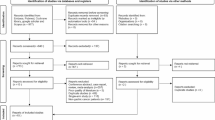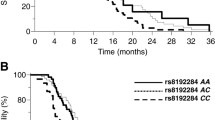Abstract
Background
Key molecules in the T helper (Th)1 and Th2 pathways underlie differential responses to the progression and surgical treatment of cancer. We investigated the relationship between Th1/Th2 cytokine polymorphism and prognosis in patients with thoracic esophageal squamous cell cancer.
Materials and Methods
The study participants were 159 Japanese patients treated for thoracic esophageal squamous cell cancer with curative esophagectomy at Akita University Hospital. We determined the associations between prognosis following esophagectomy and genetic polymorphisms in Th1 cytokines (interleukin [IL]-2, Interferon-γ, IL-12β), and Th2 cytokines (IL-4, IL-10).
Results
IL-2 −330T>G genetic polymorphism was significantly associated with prognosis after esophagectomy. Univariate and multivariate analyses using a Cox proportional hazards model revealed that patients carrying the IL-2 −330G/G genotype had a significantly poorer prognosis than those carrying the T/G or T/T genotype. However, IL-2 −330T>G polymorphism was not associated with preoperative serum IL-2 levels. Moreover, interferon-γ, IL-12β, IL-4, and IL-10 genetic polymorphisms were not associated with prognosis after esophagectomy for thoracic esophageal squamous cell cancer.
Conclusions
It is suggested that IL-2 −330T>G genetic polymorphism may be a predictive factor for prognosis in patients receiving esophagectomy for thoracic esophageal squamous cell cancer.



Similar content being viewed by others
References
Kranzfelder M, Büchler P, Lange K, Friess H. Treatment options for squamous cell cancer of the esophagus: a systematic review of the literature. J Am Coll Surg. 2010;210:351–9.
Penman ID, Henry E. Advanced esophageal cancer. Gastrointest Endosc Clin N Am. 2005;15:101–16.
Mariette C, Taillier G, Van Seuningen I, Triboulet JP. Factors affecting postoperative course and survival after en bloc resection for esophageal carcinoma. Ann Thorac Surg. 2004;78:1177–83.
Stocker G, Ott K, Henningsen N, Becker K, Hapfelmeier A, Lordick F, et al. CyclinD1 and interleukin-1 receptor antagonist polymorphisms are associated with prognosis in neoadjuvant-treated gastric carcinoma. Eur J Cancer. 2009;45:3326–35.
Lurje G, Zhang W, Schultheis AM, Yang D, Groshen S, Hendifar AE, et al. Polymorphisms in VEGF and IL-8 predict tumor recurrence in stage III colon cancer. Ann Oncol. 2008;19:1734–41.
Schöndorf T, Eisele L, Göhring UJ, Valter MM, Warm M, Mallmann P, et al. The V109G polymorphism of the p27 gene CDKN1B indicates a worse outcome in node-negative breast cancer patients. Tumour Biol. 2004;25:306–12.
Liu G, Gurubhagavatula S, Zhou W, Wang Z, Yeap BY, Asomaning K, et al. Epidermal growth factor receptor polymorphisms and clinical outcomes in non-small-cell lung cancer patients treated with gefitinib. Pharmacogenomics J. 2008;8:129–38.
Lagmay JP, London WB, Gross TG, Termuhlen A, Sullivan N, Axel A, et al. Prognostic significance of interleukin-6 single nucleotide polymorphism genotypes in neuroblastoma: rs1800795 (promoter) and rs8192284 (receptor). Clin Cancer Res. 2009;15:5234–9.
Okuno T, Tamura T, Yamamori M, Chayahara N, Yamada T, Miki I, et al. Favorable genetic polymorphisms predictive of clinical outcome of chemoradiotherapy for stage II/III esophageal squamous cell carcinoma in Japanese. Am J Clin Oncol. 2007;30:252–7.
Sarbia M, Stahl M, von Weyhern C, Weirich G, Pühringer-Oppermann F. The prognostic significance of genetic polymorphisms (methylenetetrahydrofolate reductase C677T, methionine synthase A2756G, thymidilate synthase tandem repeat polymorphism) in multimodally treated oesophageal squamous cell carcinoma. Br J Cancer. 2006;94:203–7.
Wu X, Gu J, Wu TT, Swisher SG, Liao Z, Correa AM, et al. Genetic variations in radiation and chemotherapy drug action pathways predict clinical outcomes in esophageal cancer. J Clin Oncol. 2006;24:3789–98.
Yu H, Pardoll D, Jove R. STATs in cancer inflammation and immunity: a leading role for STAT3. Nat Rev Cancer. 2009;9:798–809.
Onoé K, Yanagawa Y, Minami K, Iijima N, Iwabuchi K. Th1 or Th2 balance regulated by interaction between dendritic cells and NKT cells. Immunol Res. 2007;38:319–32.
Ross OA, Curran MD, Meenagh A, Williams F, Barnett YA, Middleton D, et al. Study of age-association with cytokine gene polymorphisms in an aged Irish population. Mech Ageing Dev. 2003;124:199–206.
Pravica V, Perrey C, Stevens A, Lee JH, Hutchinson IV. A single nucleotide polymorphism in the first intron of the human IFN-gamma gene: absolute correlation with a polymorphic CA microsatellite marker of high IFN-gamma production. Hum Immunol. 2000;61:863–6.
Hall MA, McGlinn E, Coakley G, Fisher SA, Boki K, Middleton D, et al. Genetic polymorphism of IL-12 p40 gene in immune-mediated disease. Genes Immun. 2000;1:219–24.
Noguchi E, Shibasaki M, Arinami T, Takeda K, Yokouchi Y, Kawashima T, et al. Association of asthma and the interleukin-4 promoter gene in Japanese. Clin Exp Allergy. 1998;28:449–53.
Edwards-Smith CJ, Jonsson JR, Purdie DM, Bansal A, Shorthouse C, Powell EE. Interleukin-10 promoter polymorphism predicts initial response of chronic hepatitis C to interferon alfa. Hepatology. 1999;30:526–30.
Hyngstrom JR, Posner MC. Neoadjuvant strategies for the treatment of locally advanced esophageal cancer. J Surg Oncol. 2010;101:299–304.
Udagawa H. Chemoradiotherapy: its effectiveness, toxicity, and perspective in the treatment of esophageal cancer. Ann Thorac Cardiovasc Surg. 2009;15:359–61.
Lucey DR, Clerici M, Shearer GM. Type 1 and type 2 cytokine dysregulation in human infectious, neoplastic, and inflammatory diseases. Clin Microbiol Rev. 1996;9:532–62.
Sakaguchi S, Yamaguchi T, Nomura T, Ono M. Regulatory T cells and immune tolerance. Cell. 2008;133:775–87.
D’Souza WN, Lefrancois L. IL-2 is not required for the initiation of CD8 T cell cycling but sustains expansion. J Immunol. 2003;171:5727–35.
Lenardo MJ. Interleukin-2 programs mouse alpha beta T lymphocytes for apoptosis. Nature. 1991;353:858–61.
John S, Turner D, Donn R, Sinnott P, Worthington J, Ollier WE, et al. Two novel biallelic polymorphisms in the IL-2 gene. Eur J Immunogenet. 1998;25:419–20.
Hoffmann SC, Stanley EM, Darrin Cox E, Craighead N, DiMercurio BS, Koziol DE, et al. Association of cytokine polymorphic inheritance and in vitro cytokine production in anti-CD3/CD28-stimulated peripheral blood lymphocytes. Transplantation. 2001;72:1444–50.
Matesanz F, Fedetz M, Leyva L, Delgado C, Fernandez O, Alcina A. Effects of the multiple sclerosis associated −330 promoter polymorphism in IL2 allelic expression. J Neuroimmunol. 2004;148:212–7.
Nishimura T, Nakui M, Sato M, Iwakabe K, Kitamura H, Sekimoto M, et al. The critical role of Th1-dominant immunity in tumor immunology. Cancer Chemother Pharmacol. 2000;46:52–61.
Author information
Authors and Affiliations
Corresponding author
Rights and permissions
About this article
Cite this article
Motoyama, S., Miura, M., Hinai, Y. et al. Interleukin-2 −330T>G Genetic Polymorphism Associates with Prognosis Following Surgery for Thoracic Esophageal Squamous Cell Cancer. Ann Surg Oncol 18, 1995–2002 (2011). https://doi.org/10.1245/s10434-011-1553-2
Received:
Published:
Issue Date:
DOI: https://doi.org/10.1245/s10434-011-1553-2




